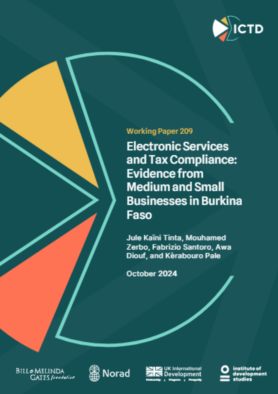Working Paper 209
African governments are increasingly digitalising their tax systems, with the hope of raising more revenue through digitalisation. This paper investigates the adoption and impact of electronic services on tax outcomes, focusing on small and medium enterprises (SMEs) in Burkina Faso. We focus on three indicators of e-service adoption by taxpayers – namely registering for the eSINTAX platform, using it for e-filing (called eSINTAX filing), and paying taxes digitally (called tax epayment). We rely on survey data from 1,090 SMEs and tax administrative data of about 17,000 SMEs on eSINTAX, tax returns and payments.
We present three sets of results. First, key drivers for adopting eSINTAX services include having SARL legal status, using electronic billing machines, having higher tax knowledge, operating in the trade sector, undergoing audits, having a dedicated accounting department, and being an older business. Second, we explore how technology usage shapes tax attitudes and perceptions. While no strong relationship is found between eSINTAX filing and practical perceptions of navigating the tax system, tax e-payment significantly improves the perceived ease of filing and facilitates compliance, particularly after tax adjustments. Also, eSINTAX enhances perceptions of tax system fairness, transparency, and trust, and reduces perceived corruption. Lastly, we document the causal impacts of eSINTAX services on tax declarations and payments. Registering for eSINTAX significantly increases declared tax liabilities, a trend that continues with eSINTAX filing. Tax e-payment results in higher tax amounts paid compared to non-digital methods.
Based on these findings, the paper offers policy recommendations for the Burkinabe revenue authority and other African governments aiming to leverage digitalisation to strengthen their tax systems. These recommendations include the launch of targeted awareness-raising campaigns and the organisation of practical training to encourage the adoption of digital tax services. There should also be more investment in digital infrastructure and e-payment security to ensure reliability and trust in e-payment systems.

